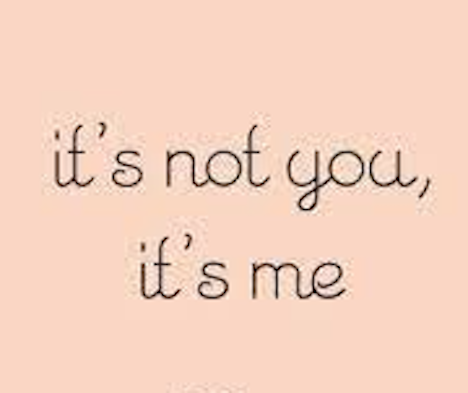Operation Inspiration
By It’s kind of cliché, but often we don’t want to get into discussions about what we don’t like about someone else so instead of explaining what’s happening, we give excuses.
Shidduchim is a perfect example. A girl goes out on a date with a boy and while they’re driving, someone cuts him off in traffic. He starts yelling at the guy and speeds up to cut off the other driver in spite.
While some girls may like this behavior, (and they probably ought to get their heads examined, if so) the hypothetical girl of our example does not. For the rest of the evening, throughout the conversation, she can’t put it out of her mind. When she speaks to the shadchan, she doesn’t want to hurt the guy’s chances of other Shidduchim so she just says it wasn’t right for her.
Essentially, she’s said, “It’s not you; it’s me.” There is nothing wrong with you, but the reason I’m not going forward is because of an issue that I have. It’s a way to be nice, but then again, it’s not necessarily the best way to handle things. What if nobody ever told this fellow that road rage isn’t attractive? What if he went through life making the same mistake because nobody pointed out the error of his ways? Sadly, he would continue to alienate people and not know what he did wrong.
It’s like the guy I’ve written about in the past who, when he went to pick up a girl, honked the horn and waited for her to come out. When my friend’s cousin was the recipient of such a tootling, she refused to go out with a guy who wouldn’t come get her from the door. When my friend relayed the message that his cousin said she wasn’t going to go out with him, the guy smacked the wheel and cluelessly said, “They ALWAYS say that!” Maybe letting him know what was wrong would be better.
Or consider someone going for a job interview, who had an everything bagel for lunch. Their teeth are now sparkling white with a few noticeable black dots, and that’s all an interviewer would see. A true friend would point out what was wrong. I recall a salesman making a presentation and I didn’t hear a word he said because his bottom shirt button was open and one string of his tzitzis was popping through and hanging down by itself. It distracted me but I couldn’t tell him about it then.
However, I was thinking that sometimes “It’s not you; it’s me” is very appropriate.
While driving with my daughter, I was doing a good speed on an unusually empty highway and she asked, “Why are you going so fast when you have to get off in half a mile?” I quickly glanced at my GPS and realized she was right. Though I could have continued on that highway, Google Maps thought I should take a different route. Not having time to compare routes, I exited. Sure enough, as luck would have it, we hit traffic. Not only that, but the exit we were supposed to take was closed and we had an 8-mile detour! We ended up arriving half an hour later than if we’d stayed on the first highway.
My daughter apologized for saying anything but I assured her she’d done nothing wrong. She was bringing the GPS route to my attention and I knew it was bashert anyway. In effect I said, “It’s not you; it’s me.” It was not she who had made us get stuck, even though I might have stayed the other way had I not noticed the GPS. There was no reason to blame her, and I wanted to make sure she didn’t feel guilty. That was a good time for that sentiment.
Another time to use this technique, though somewhat more difficult, is when someone did something to harm you. You should tell yourself that it wasn’t their doing, but rather a decree from Hashem, like Dovid HaMelech said about the curse of Shimi ben Geira. “Hashem said, “Curse Dovid!”” He rationalized. He was therefore not hurt or upset by it, or at least he didn’t take it personally as an affront from Shimi and he understood that Hashem was behind it. If we tell ourselves this when people hurt or insult us, we’ll be better able to handle it and we won’t blame or hold onto hard feelings.
Finally, there’s another time when it’s great to say “It’s not you, it’s me” even when it isn’t true.
Remember that case we mentioned about five seconds ago where someone did something bad to you? Remember how I said you should say, “It was meant to be”? That only works when you’re the one who was wronged. However, if you’re the one someone feels did something to hurt them, even if it was clearly bashert like my daughter and the GPS, you should not tell them, “why are you blaming me? It was Hashem!”
That’s because if they are hurting they won’t be able to see things as calmly as you are. They need the kindness that you can give them by taking responsibility and apologizing. The upside is that since you really didn’t do anything wrong, it’s easier to “take responsibility” for your actions and the problem, and make them feel better at the same time.
In other words, now would be an excellent time to say, “It’s not you; it’s me” to avoid hurting their feelings, and hopefully at some point later on they’ll take a good look in the mirror and realize you were just being nice.
© 2021 – All Rights Reserved
Did you enjoy this column? Feedback is welcome and appreciated. E-mail info@JewishSpeechWriter.com to share your thoughts. You never know when you may be the lamp that enlightens someone else
